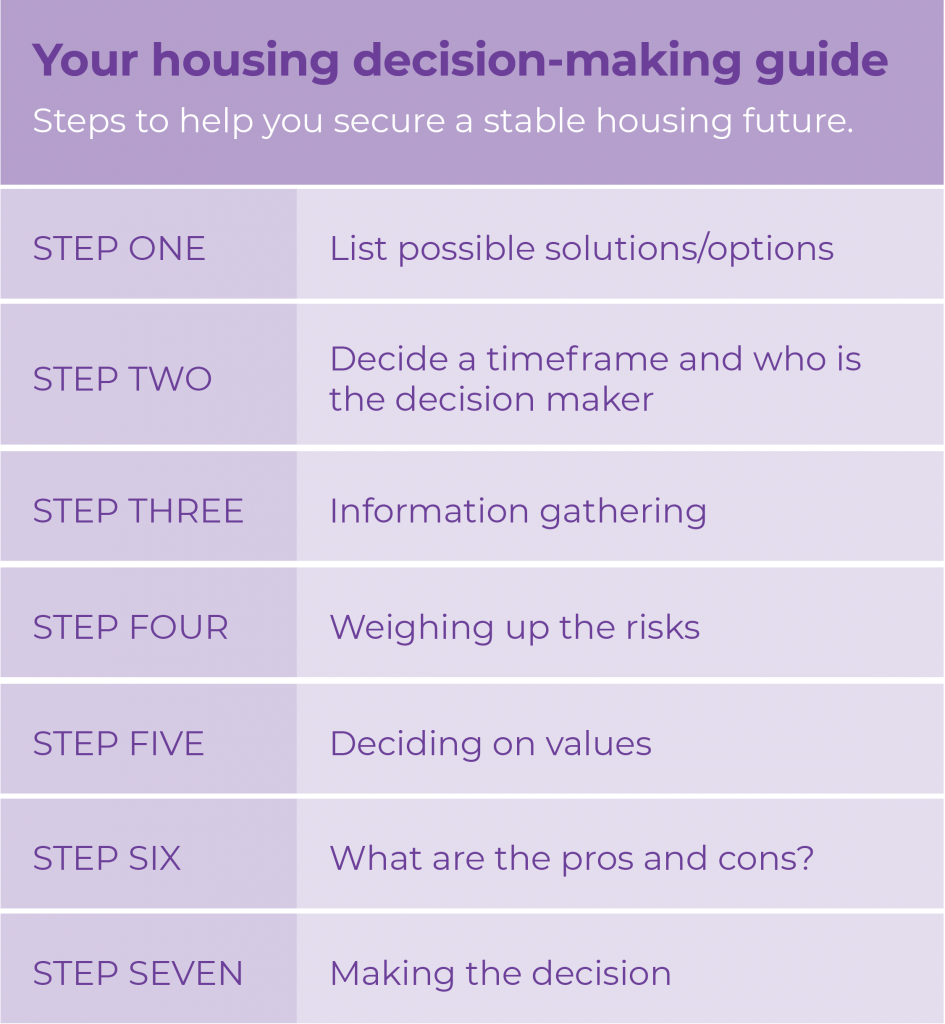
Planning and decision making
Jun 17, 2020
They say if you fail to plan, you plan to fail. And while it seems a little extreme, research shows that just by writing down our goals and sharing them with friends, we're more likely to achieve them. The same is true with a secure housing plan. By getting it out of your head and onto a page, you're taking the first step in moving towards secure housing.
Planning and decision making
Before you start on a plan think about how you make decisions. If this is the first time you have had to do this by yourself, don’t worry. Yes, flying solo can be scary but if you seek support and information you will get to the decision that you need to make.

Fear of making plans and decisions
Almost everyone experiences times when they feel overwhelmed by decisions they need to make. For some people, just the thought of having to make a decision causes anxiety. At its extreme it's called 'decisionophobia'. Is this you? Do you avoid decisions, defer to others, seek direction for psychics and horoscopes, and get anxious around any decision? If you recognise this in yourself you are already on a path taking control, making more decisions and making good decisions.
What is teleophobia?
We've mentioned decisionophobia; the fear of making decisions. Well, there's also 'teleophobia' (sometimes spelt telophobia), which is the unreasonable and irrational fear of making definite plans. Yes, it's a thing, and many people suffer from it. If you are prone to both, you can work on them together.
As with any phobia, the symptoms can vary widely from mild to severe, with people avoiding planning as a result. Sometimes your underlying belief system can feed this fear. For example, you might believe that planning reduces your spontaneity or your ability to take up opportunities as they arise. You might also believe planning will mean you will lose control, or be forced to make a commitment.
Sound like you?
Effective Decision-Making
Working through your housing options will require you to make decisions. If you are struggling to do this, perhaps you are thinking:
- I don’t have enough information
If you do not have enough information, it can feel like you are making a decision without anything basis. Take some time to gather the necessary data to inform your decision, even if the timeframe is very tight. - I have too much information
The opposite problem – having so much information that it is impossible to see ‘the wood for the trees’. This is sometimes called analysis paralysis. This problem can often be resolved by deciding what information is really important and why, and by setting a clear timescale for decision-making, including an information-gathering stage. - Too many people want to tell me what to do
Making decisions by committee is difficult. Everyone has their own views, and their own values. While it’s important to know what these views are, and why they are important, it is important for you to take responsibility for a decision – because it's your decision, good or bad. - This decision will impact others that I care about
Decision-making processes often flounder under the weight of vested interests. Sometimes it is hard to identify them, and then address them, but it can be helpful to talk to someone who is or has been in a similar position. Sometimes your family may want you to do a certain thing, but remember this housing decision is about you. - I don't want anything to change
You may be very attached to your current housing. Decisions tend to involve the prospect of change, which you may find difficult. Remember that ‘deciding not to decide’ is also a decision. - I don't really care what happens. Is that wrong?
Sometimes it’s difficult to make a decision because you just don’t care one way or the other. In this case, a structured decision-making process can often help by identifying some very real pros and cons of particular actions or inactions.
A 7-step decision making process
1. List all possible solutions/options
This process could include brainstorming or some other idea-generating process. List any possible options and don't make judgements at this stage.
2. Make a timeline
When does a decision need to be made? These questions can help:
- How much time is available to spend on this decision?
- Is there a deadline? What are the consequences of missing it?
- Is there an advantage in making a quick decision?
- How important is it to make a decision?
- How important is it that the decision is right?
- Will spending more time improve the quality of the decision?
Remember that sometimes a quick decision or a decision at the right time is more important than ‘the right’ decision, and that at other times, the reverse is true.
These questions might help:
- Who has to carry out the course of action decided?
- Who will it affect if something goes wrong? Is there a Plan B?
- Are you willing to take responsibility for a mistake?
- Should you keep a record of this decision?
3. Gather any additional information you may need
Before making a decision, all relevant information needs to be gathered. If there is adequate or out-dated information then it is more likely than a wrong decision might be made, therefore you need up-to-date, accurate information.
4. Weighing up the risks involved
Consider what the risk of the worst possible outcome occurring might be, and to decide if the risk is acceptable. The choice can be between going ‘all out for success’ or taking a safe decision. Think about your “Plan B” and what would you do if this worst case outcome happened.
5. Deciding on values
Everybody has their own unique set of values that they believe to be important. List the values that are important to you.
6. Weighing up the pros and cons
One good way to do this is to use a ‘balance sheet’, weighing up the pros and cons (benefits and costs) associated with that solution. Try to consider each aspect of the situation in turn, and identify both good and bad. Try rating the pros and cons out of 10.
7. Making the decision
Finally, it’s time to actually make the decision! You may get to this stage, and have a clear ‘winner’ but still feel uncomfortable. If that is the case, don’t be afraid to revisit the process. You may not have listed all the pros and cons, or you may have placed an unsuitable weighting on one factor. Your intuition or ‘gut feeling’ is a strong indicator of whether the decision is right for you and fits with your values.
And finally whatever your decision, own it – even if it is to not make a decision or defer making a decision.
Ready for the next step? It's time to create your plan on a page.




